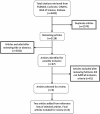Noncommunicable diseases among urban refugees and asylum-seekers in developing countries: a neglected health care need
- PMID: 24708876
- PMCID: PMC3978000
- DOI: 10.1186/1744-8603-10-24
Noncommunicable diseases among urban refugees and asylum-seekers in developing countries: a neglected health care need
Abstract
With the increasing trend in refugee urbanisation, growing numbers of refugees are diagnosed with chronic noncommunicable diseases (NCDs). However, with few exceptions, the local and international communities prioritise communicable diseases. The aim of this study is to review the literature to determine the prevalence and distribution of chronic NCDs among urban refugees living in developing countries, to report refugee access to health care for NCDs and to compare the prevalence of NCDs among urban refugees with the prevalence in their home countries. Major search engines and refugee agency websites were systematically searched between June and July 2012 for articles and reports on NCD prevalence among urban refugees. Most studies were conducted in the Middle East and indicated a high prevalence of NCDs among urban refugees in this region, but in general, the prevalence varied by refugees' region or country of origin. Hypertension, musculoskeletal disease, diabetes and chronic respiratory disease were the major diseases observed. In general, most urban refugees in developing countries have adequate access to primary health care services. Further investigations are needed to document the burden of NCDs among urban refugees and to identify their need for health care in developing countries.
References
-
- UNHCR. UNHCR Global Trends 2010. Geneva: United Nations High Commissioner for Refugees; 2011.
-
- Spiegel P, Public Health and HIV Section at UNHCR. Urban refugee health: meeting the challenges. Forced Migration Review. 2010. issue 34. http://www.fmreview.org/sites/fmr/files/FMRdownloads/en/urban-displaceme....
-
- UNHCR. UNHCR Statistical Year Book 2009. Chapter V: Demographic Characteristics And Location. Geneva: United Nations High Commissioner for Refugees; 2009. p. 2010.
-
- UNHCR. UNHCR Policy on Refugee Protection and Solutions in Urban Areas. Geneva: United Nations High Commissioner for Refugees; 2009.
Publication types
MeSH terms
LinkOut - more resources
Full Text Sources
Other Literature Sources
Medical


